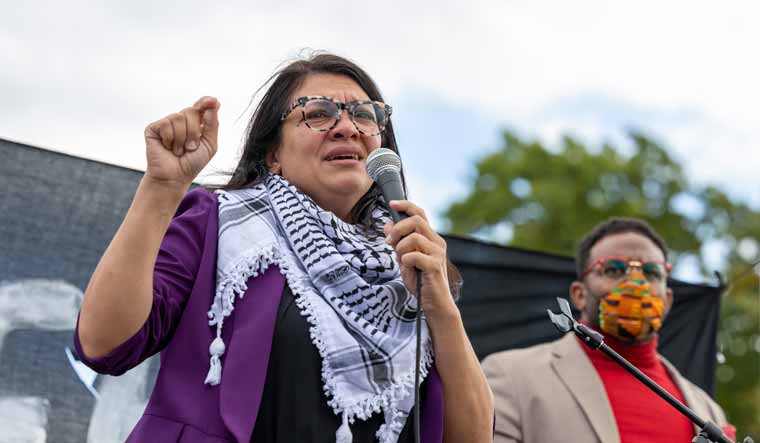The US House of Representatives voted late on Tuesday to censure the Democratic representative Rashida Tlaib of Michigan, the only Palestinian American lawmaker, for "promoting false narratives" surrounding Hamas's October 7 attack on Israel and for "calling for the destruction of the state of Israel."
The vote was passed 234 to 188, and 22 Democrats joined most Republicans to pass the resolution. Censuring is a punishment one step below expulsion from the House.
The censure measure was pushed by Republican representative Rich McCormick of Georgia on Tuesday afternoon, accusing her of promoting anti-semitic rhetoric. McCormick argued that a statement made by Tliaib calling for the end of "the apartheid system that creates the suffocating, dehumanising conditions that can lead to resistance" defended terrorism.
It also cited Tlaib’s embrace of the phrase "from the river to the sea", a pro-Palestinian rallying cry that many regard as calling for the eradication of Israel. The Anti-Defamation League call it anti-semitic and the resolution called the phrase "a genocidal call to violence to destroy the state of Israel and its people".
Tliab posted a video over the weekend which includes a clip of demonstrators chanting "from the river to the sea."
Tlaib, however, defended her criticism of the country and urged lawmakers to join in calling for a ceasefire in Gaza. In an emotional speech, Tliab said she will not be silenced. "I will not let you distort my words," Tlaib said. "No government is beyond criticism. The idea that criticising the government of Israel is antisemitic sets a very dangerous precedent, and it’s been used to silence diverse voices speaking up for human rights across our nation."
Who is Rashida Tlaib?
Rashida Tlaib is the first Muslim woman ever elected to the Michigan Legislature and one of the first two Muslim women in the U.S. Congress.
From 2009 to 2014, she served in the Michigan House and reportedly helped to secure millions of dollars for free health clinics and 'Meals on Wheels' programmes for the elderly.
Tlaib, who was born to Palestinian parents, has openly said she would "fight back against every racist and oppressive structure that needs to be dismantled" and has called out former President Donald Trump for his harsh treatment of immigrants.
Born in Detroit, Tliab has openly supported Palestinians and her recent criticism of Israel put her at the epicentre of the white-hot political fight over the Israel-Hamas war this week. She has long accused Israel of genocide and even refused to apologize after accusing Israel of causing the hospital blast in Gaza, which the US and Israel both claimed was caused by a rocket fired from Gaza itself.
Tliab created history with her choice of outfit during her swearing-in to the House of Representatives on January 3, 2019. She arrived on Capitol Hill wearing a black, traditional Palestinian thobe, previously owned by her mother and adorned with red, hand-stitched embroidery, known as tatreez. She took to Instagram to post: "Sneak peek: This is what I am wearing when I am sworn into Congress," she wrote alongside an image of a traditional red and black hand-embroidered dress, with the hashtags #PalestinianThobe and #ForMyYama.
Her choice triggered a campaign which prompted Palestinian-American women around the country to take to the social media platform to upload photos of themselves wearing their garments.
'From the river to the sea' slogan
The slogan 'From the river to the sea' is a fragment of a slogan used by pro-Palestinians since the 1960s. Protestors across the globe embed the slogan on their banners and flags and the pro-Israel people interpret it in different ways, including as a call for genocide and as democracy.
Geographically, Palestine, as it was called under the British and now Israel, covers the stretch of land from the Jordan River running north-south in the east to the Mediterranean Sea in the west. These two bodies of water are the 'river' and the 'sea' from the chant. Palestinian leader Yassef Arafat called for the establishment of a state of Palestine in 1964, citing old boundaries from the Jordan River to the Mediterranean Sea.
Hamas too claim the slogan in their rejection of Israel. "Hamas rejects any alternative to the full and complete liberation of Palestine, from the river to the sea," says the organisation’s 2017 constitution.
However, many pro-Palestinians like Palestinian-American writer Yousef Munayyer argue that those who saw "genocidal ambition in the phrase, or indeed an unambiguous desire for the destruction of Israel, did so due to their own Islamophobia." Munayyer claims the slogan is just a way to express a desire for a state in which Palestinians can live in their homeland as free and equal citizens, neither dominated by others nor dominating them.


